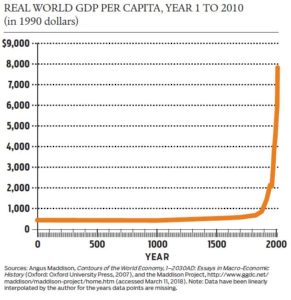In his 1944 book The Road to Serfdom, Friedrich Hayek, a future (1974) Nobel economics prize winner, spoke about “the individualist tradition which has created Western civilization” (p. 73 in the edition edited by Bruce Caldwell, University of Chicago Press, 2007).
Stokely Carmichael, a black nationalist of the 1960s and chairman of the Student National Coordinating Committee, said (as quoted in Donald Critchlow’s In Defense of Populism [University of Pennsylvania Press, 2020], p. 97):
When you talk about black power, you talk of building a movement that will smash everything Western civilization has created.
This trope has been common for at least several decades among the people who call for a political system that would impose their ideas by force and reduce the world to servitude and poverty. For example, I read in the Philadelphia Enquirer about a sex therapist and activist (“To End Fatfobia, We Need To Dismantle Western Civilization, Says Phily Therapist Sonalee Rashatwar,” July 3, 2019):
Rashatwar, though, considers how sizeism is affected by racism, misogyny, classism, homophobia, transphobia, and ableism. …
Citing researcher-advocate Caleb Luna, Rashatwar said curing anti-fatness would mean dismantling society’s foundation: “I love to talk about undoing Western civilization because it’s just so romantic to me.”
From all we know about history and economics, only the Western civilization could bring freedom of speech and inquiry, the Enlightenment, and the Industrial Revolution that followed. The latter event allowed not only an unheard-of jump in population but also an increase in the standard of living as had never happened in the history of mankind. The chart nearby is reproduced from my review of economic historian Joel Mokyr’s book A Culture of Growth in the Summer 2018 issue of Regulation (the data come from the Maddison Project‘s estimates). If I may quote my review:
From Year 1 of the Common Era until the 18th century, human living standards scarcely changed. World gross domestic product per capita inched up slightly from less than $500 per year during the first millennium, to $616 in 1700, and $712 in 1820. Then, production and income exploded. In less than two centuries, GDP per capita multiplied by more than 10, reaching $7,814 in 2010 (the last year available in this series). These figures are averages over the whole world, estimated in constant 1990 dollars. In the United States, GDP per capita (again in constant 1990 dollars) reached $30,491 in 2010. This one dramatic transformation is the story of mankind from an economic standpoint. In comparison, the last century’s Great Depression barely registered.
Another book, Walter Scheidel’s Escape from Rome, explains how, contrary to the relatively anarchic character of the Western civilization following the fall of the Roman empire, the East remained dominated by dirigiste and stifling empires.
Assume that human flourishing and individual liberty are values to be pursued. Then, if Western civilization had never existed, it is likely that the world would be bare.
It is true that we have no way of measuring the utility (“happiness” or, more precisely in economics, preferred position) of individuals in the West and comparing it with the utility of individuals in the East. We cannot meaningfully say, “people in the West are happier than people in the East” or, even worse, “the West is happier than the East.” Interpersonal comparisons of utility are impossible. But this is not an argument for believing that people living under tyranny are happier than free individuals. On the contrary, it is an argument for letting each individual free to pursue his own conception of happiness to all extent possible.



READER COMMENTS
Shane L
Jun 14 2021 at 9:43am
I think you could actually be stronger on this, because there seems to be a positive relationship between free markets and social liberalism too. In Europe, socially conservative views are often stronger in the former communist east, rather than the historically more free market west.
For example, see the Eurobarometer survey statement: “The most important role for a man is to earn money.” The highest percentage of responses agreeing with the statement come from:
Bulgaria 81%
Hungary 79%
Slovakia 75%
Czech Republic 72%
Latvia 68%
Lithuania 67%
Romania 67%
…All former communist countries. By contrast, the highest percentage of responses disagreeing come from:
Sweden 10%
Denmark 17%
Netherlands 18%
Finland 26%
And so on. Browsing that document alone we see this pattern again and again, with respondents in former communist countries voicing more traditional, conservative positions, compared with respondents in countries with historically more free markets. These include statements such as: “Women are more likely than men to make decisions based on their emotions”, “It is acceptable for men to cry”, “Promoting gender equality is important to ensure a fair and democratic society”.
This is true for other social issues too. Asked if gay people should have the same rights as heterosexual people, 98% of Swedes said yes, compared with 31% of Slovaks and 38% of Romanians. Asked if they’d be comfortable with a Roman person being in the highest elected office, 76% of Dutch said yes, compared with 21% of Lithuanians.
My guess is that communist autocracy hindered the vigorous discussion of social issues that was enjoyed in the more free west, causing the communist societies to stagnate in conservative equilibrium.
Shane L
Jun 14 2021 at 9:44am
Small typo in my last post – I meant “Roma”, not “Roman”.
Pierre Lemieux
Jun 14 2021 at 2:40pm
Shane: Yes, yours is a valuable addendum to the conversation. (Your link seems to be unreachable, though). There also, however, Hayek, who refused the label “conservative,” has something to teach us. It is one thing to argue, like John Stuart Mill and Hayek, for the individual freedom to experiment with new moral principles and lifestyles at one’s own risk in private relations (some people may not talk to you anymore if, for example, you start a movement for free love-making suspended from helicopters); it is another thing, which Hayek forcefully argued against, to propose that traditional morals be rejected wholesale and that the state should encourage it (by paying the helicopter rentals, for example).
Jose Pablo
Jun 14 2021 at 12:22pm
It is unbelievable that we have to keep repeating this self-evident argument.
And yet, the idea of “placing the collective above the individual” exerts a powerful attraction over the human mind. Not only “political system” (Peru as the latest example), but also religious movement (most religions, if not all of them, limit individual freedom to favor the “community”) and even movies: Avatar was a blockbuster (and even got a theme park) by exploiting this very same sentiment (well, it was also a “new version” of Rousseau’s noble savage … a very popular myth nowadays too)
Why is so?
Pierre Lemieux
Jun 14 2021 at 2:49pm
Jose: Good question. Hayek would answer that tribal values have been hard-wired in our genes and that it requires an effort not to obey our genes and instead to embrace the impersonal and abstract order of the market society (see his trilogy Law, Legislation and Liberty, vol. 1 and 2). I would however suggest (and Hayek would probably agree) that private, non-state institutions like the family and organized religion provide a useful outlet for our instinctive need for community.
Jose Pablo
Jun 14 2021 at 12:28pm
By the way.
An interesting Cochrane’s discussion (based on a Woolridge’s essay): maybe is not democracy the ticket to prosperity … but meritocracy.
https://johnhcochrane.blogspot.com/2021/06/meritocracy.html#more
I don’t think there is a contradiction here: meritocracy favors the individual more than democracy does. It is also, I think, “closer to the dark side” (there is less distance from “meritocracy” to “tyranny” than from “democracy”)
Pierre Lemieux
Jun 14 2021 at 4:58pm
Pablo: An interesting read, thanks. I agree with Cochrane in most of what he says. The problem in meritocracy is the “cracy.” Unhindered by the state, competiti0n between private institutions and organizations (and even between public ones in a decentralized regime) should naturally ensure the triumph of meritocracy over wokism and other forms of mediocrity.
Another thought: “meritocracy” often seems to be used for “superior people.” As Hayek said (in the postscript to The Constitution of Liberty):
Roger McKinney
Jun 14 2021 at 1:01pm
Nice history! But where did Hayek’s “True” individualism come from? Larry Seidentop in his Inventing the Individual: The Origins of Western Liberalism shows that it came from Christianity implementing its view of the individual in politics. Hayek thought it merely evolved, but he also acknowledged the theologians at the University of Salamanca, Spain, in the Reformation as the first modern economists who gave us classical liberalism. See this: https://finance.townhall.com/columnists/rogermckinney/2020/01/23/the-christian-origins-of-austrian-economics-n2559993
I summarize the best historians, including Hayek and Mises, on the origins of capitalism in God is a Capitalist: Markets from Moses to Marx.
Pierre Lemieux
Jun 14 2021 at 6:19pm
Interesting article, Roger. (I am sure God loves math, though.)
David
Jun 16 2021 at 8:31am
“Interpersonal comparisons of utility are impossible.” Why? For example, say I see someone smiling, enjoying a good meal with friends. A block away, I see someone destitute, diseased, crying alone. Why not accept the obvious inference that the first person is better off in terms of utility?
Pierre Lemieux
Jun 16 2021 at 9:51am
David: Because utility is subjective and you are not in these persons’ minds. You mean you met Mother Teresa happily suffering for God and confessing her sins and Bernie Madoff (or Robert Maxwell)? Who will commit suicide tomorrow? Another observer may have a different evaluation than yours and none of you two will be able to scientifically prove his conjecture.
Atanu Dey
Jun 17 2021 at 3:41pm
Pierre, thanks for the fine article. I enjoyed your review of Mokyr’s book as well.
I have a small nitpick here. Why do people trot out M. Teresa as some sort of paragon of selflessness? She was really not in it for helping the poor. As Hitchens argued persuasively, she was a friend of poverty and not a friend of the poor.
Kind regards.
Pierre Lemieux
Jun 19 2021 at 9:51pm
Atanu: I haven’t read Hitchens on this but it wouldn’t take much to bring me to that viewpoint.
Thomas Lee Hutcheson
Jun 17 2021 at 5:36am
I agree with your anti-revolution point.
I disagree only if it is interpreted as relevant to issues such as, should we raise certain taxes in order to transfer income to parents of children or the optimal rate of taxation of net CO2 emissions.
Pierre Lemieux
Jun 19 2021 at 9:58pm
Thomas: I see your point, but if you could make a public-good argument for a carbon tax as opposed to a simple externality-argument, your position would be more solid. Otherwise, why should the state take sides for people who will be inconvenienced by climate change (assuming it is occurring and can be changed) instead of for people who like warm beaches and need their money to spend time there? (Is global warming like an asteroid on the verge of colliding with Earth?) And why indeed shouldn’t the state take sides instead for parents and their children or for, say, people with acne?
mark
Jun 20 2021 at 5:09am
As a historian, I find “western civilization” not much of an explanatory term in this economic context. What “civilization” the “west” had in the centuries before, say 1750? – Maybe the “industrial revolution”* created “a-new-western-civilization” as much or more than any civilization shaped the steam engine and mass-production.
If it is all about “capitalism” and if “capitalism” is just “free-market”, why did the GDP curve not shot up before? (Phoenicians, Crassus, Cordoba, Fugger, Medici or at some period/place in China, India …). Were the states so very lighter-handed in the west in the 18th century? (No, they were mostly not.)
Maybe it was an “English Civilization”? Maybe more of a “situation”. And when in that situation productivity started to outpace population growth on a massive and noticeable/behavior-changing scale, then it was that things, behavior and civilization changed.
Comments are closed.